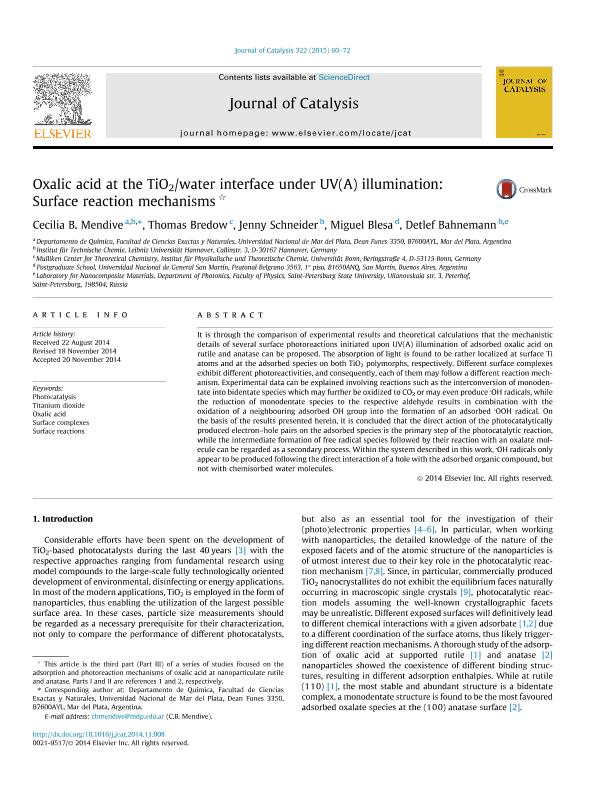Mostrar el registro sencillo del ítem
dc.contributor.author
Mendive, Cecilia Beatriz

dc.contributor.author
Bredow, Thomas

dc.contributor.author
Schneider, Jenny
dc.contributor.author
Blesa, Miguel Angel

dc.contributor.author
Bahnemann, Detlef
dc.date.available
2018-03-01T19:01:53Z
dc.date.issued
2015-02
dc.identifier.citation
Mendive, Cecilia Beatriz; Bredow, Thomas; Schneider, Jenny; Blesa, Miguel Angel; Bahnemann, Detlef; Oxalic acid at the TiO2/water interface under UV(A) illumination: Surface reaction mechanisms; Academic Press Inc Elsevier Science; Journal of Catalysis; 322; 2-2015; 60-72
dc.identifier.issn
0021-9517
dc.identifier.uri
http://hdl.handle.net/11336/37578
dc.description.abstract
It is through the comparison of experimental results and theoretical calculations that the mechanistic details of several surface photoreactions initiated upon UV(A) illumination of adsorbed oxalic acid on rutile and anatase can be proposed. The absorption of light is found to be rather localized at surface Ti atoms and at the adsorbed species on both TiO2 polymorphs, respectively. Different surface complexes exhibit different photoreactivities, and consequently, each of them may follow a different reaction mechanism. Experimental data can be explained involving reactions such as the interconversion of monodentate into bidentate species which may further be oxidized to CO2 or may even produce OH radicals, while the reduction of monodentate species to the respective aldehyde results in combination with the oxidation of a neighbouring adsorbed OH group into the formation of an adsorbed OOH radical. On the basis of the results presented herein, it is concluded that the direct action of the photocatalytically produced electron-hole pairs on the adsorbed species is the primary step of the photocatalytic reaction, while the intermediate formation of free radical species followed by their reaction with an oxalate molecule can be regarded as a secondary process. Within the system described in this work, OH radicals only appear to be produced following the direct interaction of a hole with the adsorbed organic compound, but not with chemisorbed water molecules.
dc.format
application/pdf
dc.language.iso
eng
dc.publisher
Academic Press Inc Elsevier Science

dc.rights
info:eu-repo/semantics/openAccess
dc.rights.uri
https://creativecommons.org/licenses/by-nc-nd/2.5/ar/
dc.subject
Oxalic Acid
dc.subject
Photocatalysis
dc.subject
Surface Complexes
dc.subject
Surface Reactions
dc.subject
Titanium Dioxide
dc.subject.classification
Otras Ciencias Químicas

dc.subject.classification
Ciencias Químicas

dc.subject.classification
CIENCIAS NATURALES Y EXACTAS

dc.title
Oxalic acid at the TiO2/water interface under UV(A) illumination: Surface reaction mechanisms
dc.type
info:eu-repo/semantics/article
dc.type
info:ar-repo/semantics/artículo
dc.type
info:eu-repo/semantics/publishedVersion
dc.date.updated
2018-02-28T14:11:31Z
dc.journal.volume
322
dc.journal.pagination
60-72
dc.journal.pais
Estados Unidos

dc.description.fil
Fil: Mendive, Cecilia Beatriz. Universidad Nacional de Mar del Plata. Facultad de Ciencias Exactas y Naturales. Departamento de Química; Argentina. Leibniz Universitaet Hannover; Alemania. Consejo Nacional de Investigaciones Científicas y Técnicas; Argentina
dc.description.fil
Fil: Bredow, Thomas. Universitaet Bonn; Alemania
dc.description.fil
Fil: Schneider, Jenny. Leibniz Universitaet Hannover; Alemania
dc.description.fil
Fil: Blesa, Miguel Angel. Comisión Nacional de Energía Atómica; Argentina. Universidad Nacional de General Sarmiento; Argentina. Consejo Nacional de Investigaciones Científicas y Técnicas; Argentina
dc.description.fil
Fil: Bahnemann, Detlef. Leibniz Universitaet Hannover; Alemania
dc.journal.title
Journal of Catalysis

dc.relation.alternativeid
info:eu-repo/semantics/altIdentifier/doi/http://dx.doi.org/10.1016/j.jcat.2014.11.008
dc.relation.alternativeid
info:eu-repo/semantics/altIdentifier/url/https://www.sciencedirect.com/science/article/pii/S0021951714003200
Archivos asociados
